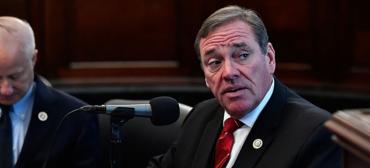
U.S. Rep. Neal Dunn, R-Fla., currently finishing his first term in Congress, scored a win last week as the U.S. House overwhelmingly passed his “Strengthening Coastal Communities Act.”
Dunn’s bill cleared the House on a 375-1 vote on Friday as U.S. Rep. Thomas Massie, R-Ky., voted against the proposal.
“The Strengthening Coastal Communities Act of 2018 makes technical corrections to the Coastal Barrier Resources maps that are adversely affecting areas in Bay and Gulf counties. The Coastal Barrier Resources Act (CBRA) was signed into law in 1982 and works to preserve our nation’s barrier islands by barring federal funds and financial assistance from being used there, which therefore disincentivizes development,” the congressman’s office noted. “Dr. Dunn’s legislation maintains these protections for our nation’s barrier islands, while simply providing for more precise digital maps to distinguish the CBRA zones.”
Fellow Florida Republican U.S. Reps. Brian Mast and Tom Rooney were cosponsors of the proposal as was U.S. Rep. Lisa Blunt Rochester, D-Del.
Dunn took to the House floor last week to weigh in on his proposal
“I’m grateful to be here today and for the opportunity to speak on this bipartisan, common sense bill to provide much needed modernization and updates of the Coastal Barrier Resources System maps. I’d like to thank Chairman Bishop for his help throughout this process as well as my colleague on the other side of the aisle Representative Blunt Rochester for her work on this issue,” Dunn said.
“The Coastal Barrier Resources Act, signed into law in 1982, is meant to preserve our nation’s barrier islands by barring federal funds and financial assistance from being used there, which therefore disincentivizes development,” Dunn added. “This bill maintains these protections for our nation’s barrier islands, while simply providing for more precise digital maps to distinguish the CBRA zones.
“For decades, some of my constituents throughout the 2nd District of Florida have been burdened by being erroneously included in CBRA zones. In some cases, this is due to the width of the pencil marks outlining the boundaries on the original outdated hand drawn maps. This was unacceptable in 1982 – it is simply outrageous in 2018,” Dunn continued.
“Now more than ever, in the wake of one of the most devastating hurricanes in American history, a lack of access to federal resources is particularly debilitating for residents in coastal communities across the Florida Panhandle,” he said in conclusion. “This means no Flood Insurance, FEMA assistance, or SBA loans. Being included in a CBRA zone in Florida even precludes the use of money resulting from the BP oil spill in 2010. I’m grateful that this bill will provide a remedy for some folks who are dealing with these unnecessary burdens. I urge my colleagues to support the bill and encourage the Senate to take it up before the end of the Congress.”
Dunn has his work cut out for him as the clock ticks down until Congress adjourns. So far, there is not a similar proposal over in the Senate.


